英语小升初专项复习——介词课件(共31张PPT)
文档属性
| 名称 | 英语小升初专项复习——介词课件(共31张PPT) | 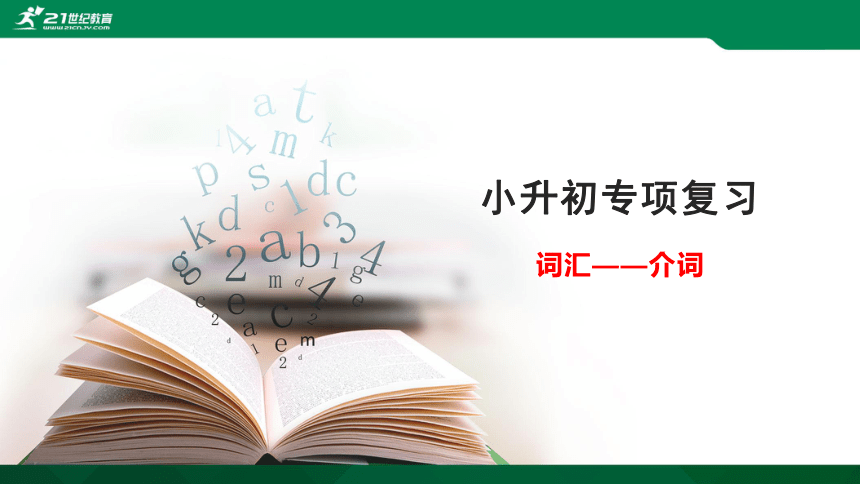 | |
| 格式 | zip | ||
| 文件大小 | 4.9MB | ||
| 资源类型 | 试卷 | ||
| 版本资源 | 通用版 | ||
| 科目 | 英语 | ||
| 更新时间 | 2020-06-18 14:24:33 | ||
图片预览

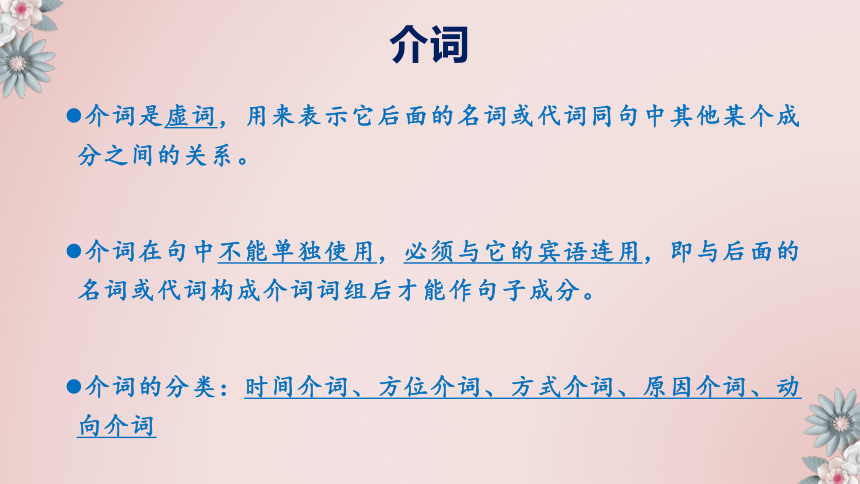
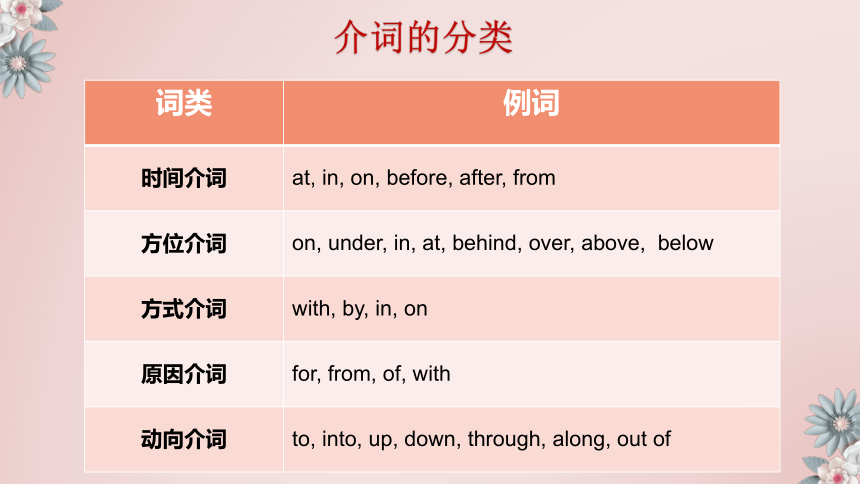
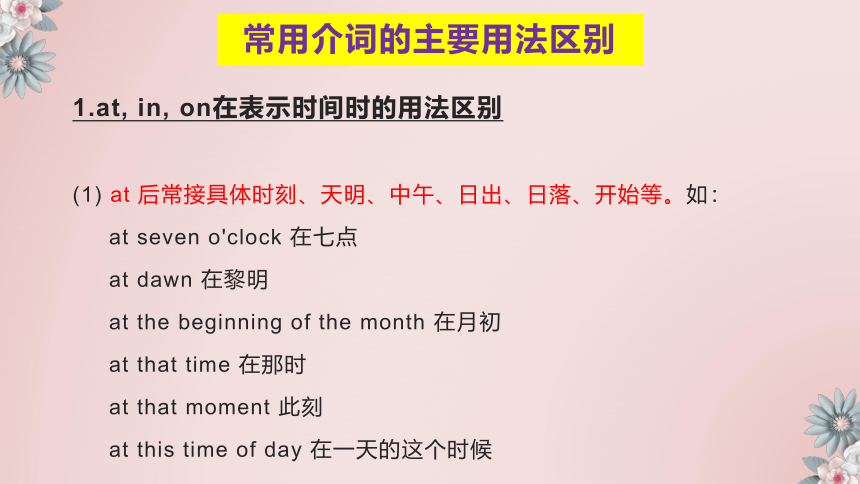
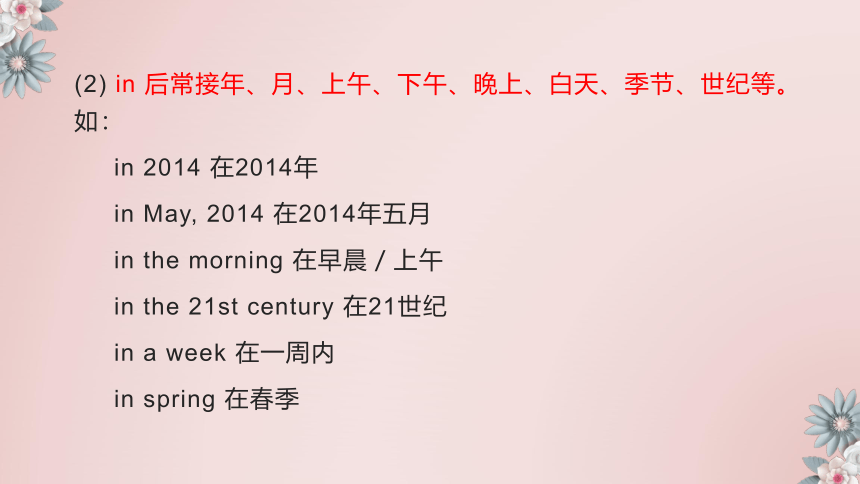
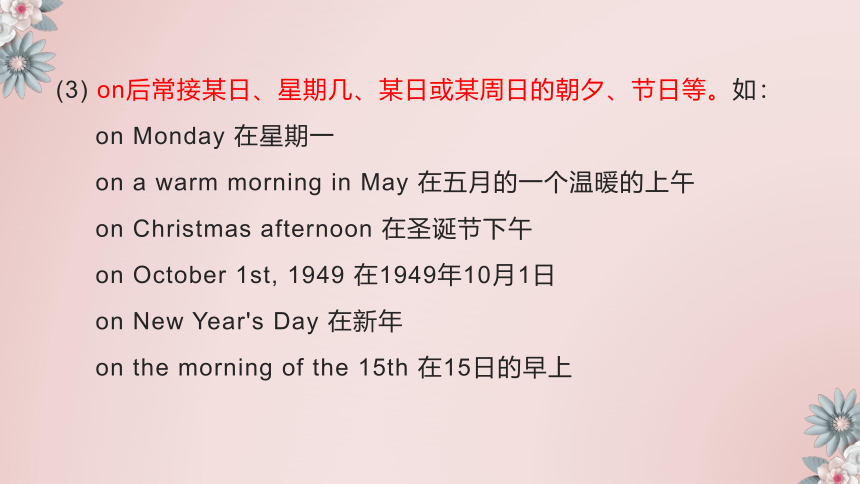
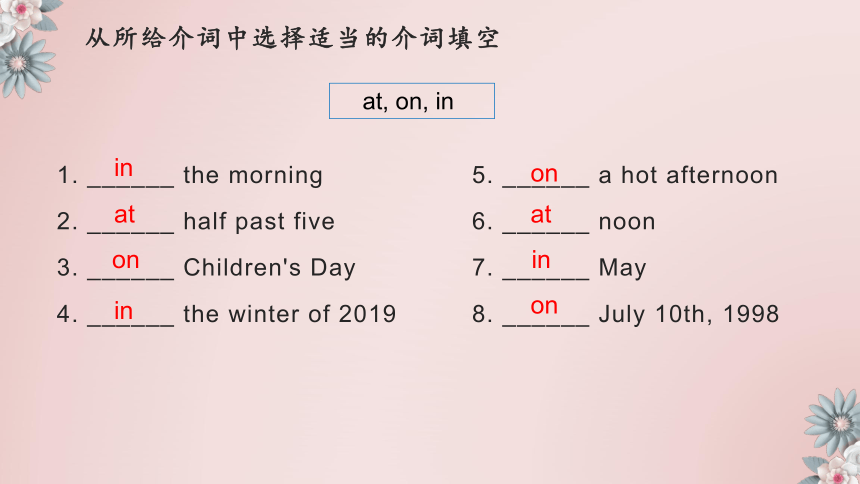

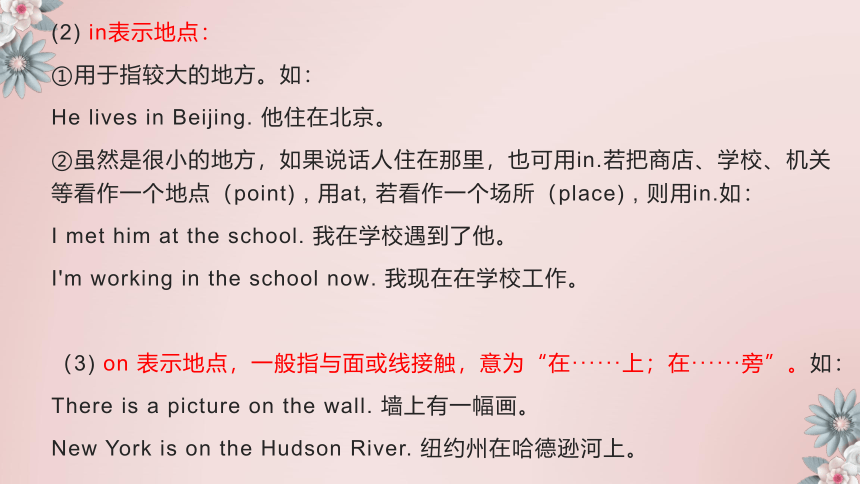
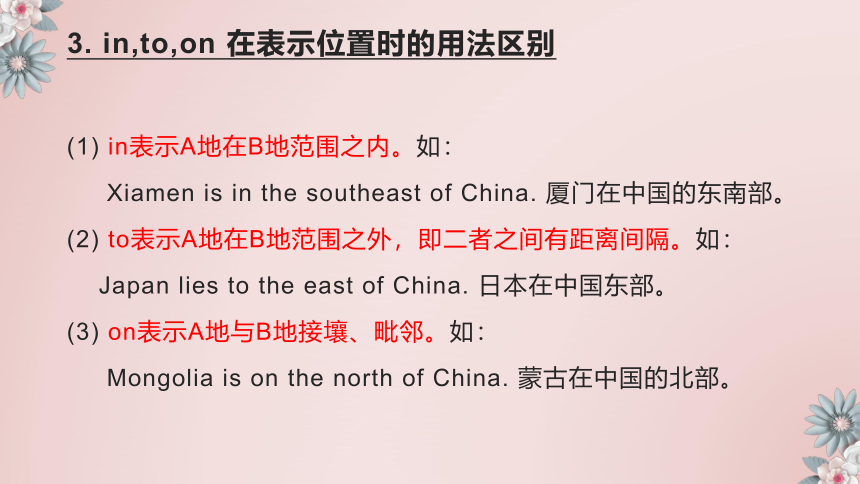
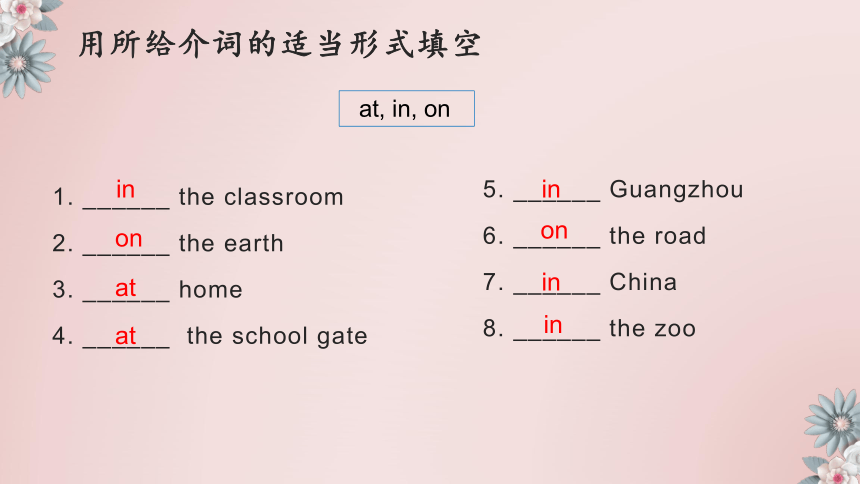
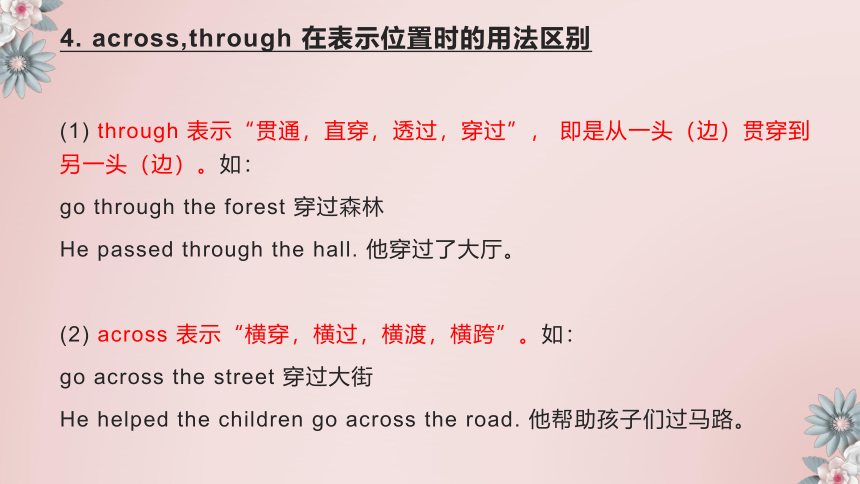
文档简介
(共31张PPT)
小升初专项复习
词汇——介词
介词
介词是虚词,用来表示它后面的名词或代词同句中其他某个成分之间的关系。
介词在句中不能单独使用,必须与它的宾语连用,即与后面的名词或代词构成介词词组后才能作句子成分。
介词的分类:时间介词、方位介词、方式介词、原因介词、动向介词
词类
例词
时间介词
at,
in,
on,
before,
after,
from
方位介词
on,
under,
in,
at,
behind,
over,
above,
below
方式介词
with,
by,
in,
on
原因介词
for,
from,
of,
with
动向介词
to,
into,
up,
down,
through,
along,
out
of
常用介词的主要用法区别
1.at,
in,
on在表示时间时的用法区别
(1)
at
后常接具体时刻、天明、中午、日出、日落、开始等。如:
at
seven
o'clock
在七点
at
dawn
在黎明
at
the
beginning
of
the
month
在月初
at
that
time
在那时
at
that
moment
此刻
at
this
time
of
day
在一天的这个时候
(2)
in
后常接年、月、上午、下午、晚上、白天、季节、世纪等。如:
in
2014
在2014年
in
May,
2014
在2014年五月
in
the
morning
在早晨/上午
in
the
21st
century
在21世纪
in
a
week
在一周内
in
spring
在春季
(3)
on后常接某日、星期几、某日或某周日的朝夕、节日等。如:
on
Monday
在星期一
on
a
warm
morning
in
May
在五月的一个温暖的上午
on
Christmas
afternoon
在圣诞节下午
on
October
1st,
1949
在1949年10月1日
on
New
Year's
Day
在新年
on
the
morning
of
the
15th
在15日的早上
从所给介词中选择适当的介词填空
1.
______
the
morning
2.
______
half
past
five
3.
______
Children's
Day
4.
______
the
winter
of
2019
5.
______
a
hot
afternoon
6.
______
noon
7.
______
May
8.
______
July
10th,
1998
at,
on,
in
in
at
on
in
on
at
in
on
2.
at,in,on
表示地点时的用法区别
(1)
at
表示地点:
①用于指较小的地方。如:
I'll
wait
for
you
at
the
station.
我将在车站等你。
②用于门牌号码前。如:
He
lives
at
105
Zhongshan
Road.
他住在中山路105号。
(2)
in表示地点:
①用于指较大的地方。如:
He
lives
in
Beijing.
他住在北京。
②虽然是很小的地方,如果说话人住在那里,也可用in.若把商店、学校、机关等看作一个地点(point)
,
用at,
若看作一个场所(place)
,
则用in.如:
I
met
him
at
the
school.
我在学校遇到了他。
I'm
working
in
the
school
now.
我现在在学校工作。
(3)
on
表示地点,一般指与面或线接触,意为“在······上;在······旁”。如:
There
is
a
picture
on
the
wall.
墙上有一幅画。
New
York
is
on
the
Hudson
River.
纽约州在哈德逊河上。
3.
in,to,on
在表示位置时的用法区别
(1)
in表示A地在B地范围之内。如:
Xiamen
is
in
the
southeast
of
China.
厦门在中国的东南部。
(2)
to表示A地在B地范围之外,即二者之间有距离间隔。如:
Japan
lies
to
the
east
of
China.
日本在中国东部。
(3)
on表示A地与B地接壤、毗邻。如:
Mongolia
is
on
the
north
of
China.
蒙古在中国的北部。
用所给介词的适当形式填空
1.
______
the
classroom
2.
______
the
earth
3.
______
home
4.
______
the
school
gate
5.
______
Guangzhou
6.
______
the
road
7.
______
China
8.
______
the
zoo
at,
in,
on
in
on
at
at
in
on
in
in
4.
across,through
在表示位置时的用法区别
(1)
through
表示“贯通,直穿,透过,穿过”,
即是从一头(边)贯穿到另一头(边)。如:
go
through
the
forest
穿过森林
He
passed
through
the
hall.
他穿过了大厅。
(2)
across
表示“横穿,横过,横渡,横跨”。如:
go
across
the
street
穿过大街
He
helped
the
children
go
across
the
road.
他帮助孩子们过马路。
5.
above,over,below,under在表示位置时的用法区别
(1)
above
指“在······上方”,
表示相对高度,不一定在正上方,其反义词为below.
如
We're
flying
above
the
clouds.
我们飞行在云层上面。
(2)
over指“在······正上方”,
表示垂直上方,其反义词为under.
如:
The
bridge
is
over
the
river.
桥在河流的上方。
(3)
on表示“在······上面”,
与物体表面接触,与
beneath
相对。如:
There
is
a
map
on
the
wall.
墙上有一幅地图。
The
cloth
is
beneath
the
book.
那块布在书底下。
6.
by,through,with
表示“方式,方法,手段”时的区别
(1)
by
表示方式:
①表示以一般的方法或方式。如:
He
earns
a
living
by
writing
poems.
他靠写诗为生。
②表示传达、传递的方式或媒介。如:
Please
send
the
letter
by
airmail.
请将这封信发航空件。
③表示用交通工具、通讯工具,后接名词单数,不加冠词。如:
He
goes
to
school
by
bus.
他乘公交车去上学。
注意下面两句的区别:
Did
you
come
by
bus?
你是坐公交车来的吗?
Did
you
come
in
his
car/
on
his
bike?
你是坐他的车/自行车来的吗?
(2)
through表示“以;通过;经由”。如:
He
passed
the
exam
through
hard
work.
经过刻苦的学习,他通过了考试。
(3)
with表示方式
①表示行为方式,意为“以;带着;用”。如:
We
are
well
provided
with
food
and
clothing.
我们被招待得很好,包括吃穿。
②表示使用具体的工具或手段。如:
He
writes
with
a
pencil.
他用铅笔写字。
注意:在表示手段时,by,through,
with
有时也可互换,但
with
的意思更明确。如:
Through/By/With
his
efforts
he
succeeded
in
making
so
many
useful
inventions.
通过努力,他成功地制造了如此多的发明。
介词的搭配方式
(1)
介词可与名词搭配。如:the
answer
to,the
key
to,a
picture
of等。
(2)
介词可与形容词搭配。如:be
afraid
of,be
tired
of,be
suitable
for,be
familiar
to/with
等。
(3)
介词可与动词搭配。如:talk
about,belong
to等。
时间名词前介词用法口诀
年月周前要用in,
具体日期却要禁,
遇到几号要用on,
上午下午又是in.
要说某日上下午,
用on换in要记清。
午夜黄昏用at,
黎明用它也不错,
at用在时分前。
说“差”可要用上to,
说“过”要用past.
地点名词前介词用法口诀
里面in,
上面on,
over,under
上下方。
in
front
of
前
behind后,
at
是在某一地点上。
from来自to
朝向,
附近就要用到near.
介词的固定搭配
(1)
at的固定搭配
at
noon
在中午
at
night
在夜晚
at
that
time
在那时
at
school
在学校
at
home
在家
at
the
foot
of
在······脚下
at
present
现在
at
the
age
of
在
.
.
.
.
岁时
arrive
at/in
到达
at
first
起初;开始
at
last
最后
at
the
moment
此刻
laugh
at
嘲笑
at
work
上班;在工作
at
the
same
time
同时
look
at
看;注视
be
good
at
善于
at
most
至多
at
least
至少
at
once
立刻;马上
(2)
in的固定搭配
in
time
及时
in
a
hurry
匆忙
in
the
sky
在天空
in
bed
在床上
in
front
of
在
.
.
.
前面
in
spring/summer/autumn/winter
在春天/夏天/秋天/冬天
be
interested
in
对
.
.
.
感兴趣
in
class
在课堂上
in
fact
事实上
in
the
morning/afternoon/evening
在上午/下午/晚上
in
January/February.
.
.
在一月/二月...
in
all
总体
in
English
用英语
in
short
总之
in
the
end
最后
in
danger
在危险中
in
a
minute
立刻
in
order
to
为了
(3)
on的固定搭配
on
time
准时
on
the
playground
在操场上
on
duty
值日
on
Monday/Tuesday.
.
.
在星期一/星期二...
on
holiday
度假
on
the
left/right
在左/右边
on
the
radio
在广播中
on
foot
步行
on
sale
出售;降价出售
on
TV
在电视上播放
on
the
phone
在电话中
on
the
way
在路上
get
off
下车
get
up
起床
help
sb.
with
sth.
帮助某人做某事
ask
for
请求
learn
from
向···学习
look
after
照顾
look
for
寻找
think
of
想到
worry
about
担心
listen
to
听
talk
about
交谈;谈论
wait
for
等候;等待
thanks
for
为····而感谢
be
afraid
of
害怕
be
careful
with
小心;关心
be
proud
of
感到自豪
be
crazy
about
对···很着迷
be
late
for
干某事迟到
by
bus/train/plane/air/ship/bike
乘公共汽车/火车/飞机/
轮船/自行车
be
good
for
对···有利
lots
of/a
lot
of
许多;大量
其他常见短语的固定搭配
Exercise
一、单项选择
(
)
1.
Which
pen
belongs
_____
Harry?
A.
from
B.
for
C.
to
D.
with
(
)
2.
Toby
is
angry
_____
his
deskmate.
A.
for
B.with
C.on
D.
at
(
)
3.
My
mother
goes
to
work
_____
foot.
But
she
goes
home
_____
bus.
A.
on;
on
B.
by;
on
C.
on;
by
D.
by;
by
(
)
4.
National
Day
is
_____
October
1st.
A.
at
B.
in
C.
by
D.
on
(
)
5.
We
usually
stay
_____
home
______
the
weekend.
A.
at;
on
B.
at;
in
C.
on;
on
D.
in;
at
C
D
C
D
A
(
)
6.
What's
this
_____
English?
A.
in
B.
on
C.
for
D.
from
(
)7.
—What
would
you
like
_____
lunch?
—Fish
and
vegetables,
please.
A.
at
B.
for
C.
of
D.
to
(
)
8.
Some
people
are
used
to
get
up
late
_____
a
cold
morning.
A.
in
B.
at
C.
on
D.
of
(
)
9.
—
Are
you
going
to
school
_____
bus?
—
No,
we
are
going
_____
Lucy's
father's
car.
A.
by;
by
B.
by;
in
C.
from;
by
D.
in;
at
(
)
10.
It's
very
hot
______
Guangzhou
_____
summer.
A.
at;
in
B.
at;
at
C.
in;
in
D.
in;
at
A
B
C
B
C
二、英汉互译
1.
look
after
_________
2.
在春天
_________
3.
在家里
_________
4.
talk
about
__________
5.
help
sb.
with
sth.
___________
6.
在晚上8点____________
7.
坐火车
___________
8.
ask
for
___________
9.
be
proud
of
___________
10.
顺便问一下
___________
照顾
in
spring
at
home
交谈;谈论
帮助某人做某事
at
eight
o'clock
in
the
evening
by
train
请求
感到自豪
by
the
way
三、根据句子意思用适当的介词填空
1.
I
stay
_____
home
every
Saturday.
2.
Sam
usually
goes
to
bed
_____
10:00
_____
the
evening.
3.
There
is
a
post
office
next
_____
the
hotel.
4.
It's
very
cold
here
_____
winter.
5.
If
you
laugh
_____
her,
she
will
shout
_____
you.
at
at
in
to
in
at
to
6.
We
don't
have
any
classes
______
Saturday
and
Sunday.
7.
My
little
brother
was
born
_____
March
and
I
was
born
_____
June
4th.
8.
Don't
sit
_____
that
dirty
chair!
9.
I
got
a
birthday
present
______
my
best
friend
Lily.
10.
My
aunt
is
very
kind
_____
me.
on
in
on
in
from
to
四、看图,用适当的介词完成句子
1.
The
desk
is
next
______
the
bed.
2.
The
computer
is
______
the
desk.
3.
The
pens
are
______
the
computer.
4.
The
clock
is
______
the
wall.
5.
The
cat
is
______
the
bedside
table.
6.
The
bedside
table
is
______
the
bed.
to
on
near
on
on
near
Thank
you!
谢谢
21世纪教育网(www.21cnjy.com)
中小学教育资源网站
有大把高质量资料?一线教师?一线教研员?
欢迎加入21世纪教育网教师合作团队!!月薪过万不是梦!!
详情请看:
https://www.21cnjy.com/help/help_extract.php
小升初专项复习
词汇——介词
介词
介词是虚词,用来表示它后面的名词或代词同句中其他某个成分之间的关系。
介词在句中不能单独使用,必须与它的宾语连用,即与后面的名词或代词构成介词词组后才能作句子成分。
介词的分类:时间介词、方位介词、方式介词、原因介词、动向介词
词类
例词
时间介词
at,
in,
on,
before,
after,
from
方位介词
on,
under,
in,
at,
behind,
over,
above,
below
方式介词
with,
by,
in,
on
原因介词
for,
from,
of,
with
动向介词
to,
into,
up,
down,
through,
along,
out
of
常用介词的主要用法区别
1.at,
in,
on在表示时间时的用法区别
(1)
at
后常接具体时刻、天明、中午、日出、日落、开始等。如:
at
seven
o'clock
在七点
at
dawn
在黎明
at
the
beginning
of
the
month
在月初
at
that
time
在那时
at
that
moment
此刻
at
this
time
of
day
在一天的这个时候
(2)
in
后常接年、月、上午、下午、晚上、白天、季节、世纪等。如:
in
2014
在2014年
in
May,
2014
在2014年五月
in
the
morning
在早晨/上午
in
the
21st
century
在21世纪
in
a
week
在一周内
in
spring
在春季
(3)
on后常接某日、星期几、某日或某周日的朝夕、节日等。如:
on
Monday
在星期一
on
a
warm
morning
in
May
在五月的一个温暖的上午
on
Christmas
afternoon
在圣诞节下午
on
October
1st,
1949
在1949年10月1日
on
New
Year's
Day
在新年
on
the
morning
of
the
15th
在15日的早上
从所给介词中选择适当的介词填空
1.
______
the
morning
2.
______
half
past
five
3.
______
Children's
Day
4.
______
the
winter
of
2019
5.
______
a
hot
afternoon
6.
______
noon
7.
______
May
8.
______
July
10th,
1998
at,
on,
in
in
at
on
in
on
at
in
on
2.
at,in,on
表示地点时的用法区别
(1)
at
表示地点:
①用于指较小的地方。如:
I'll
wait
for
you
at
the
station.
我将在车站等你。
②用于门牌号码前。如:
He
lives
at
105
Zhongshan
Road.
他住在中山路105号。
(2)
in表示地点:
①用于指较大的地方。如:
He
lives
in
Beijing.
他住在北京。
②虽然是很小的地方,如果说话人住在那里,也可用in.若把商店、学校、机关等看作一个地点(point)
,
用at,
若看作一个场所(place)
,
则用in.如:
I
met
him
at
the
school.
我在学校遇到了他。
I'm
working
in
the
school
now.
我现在在学校工作。
(3)
on
表示地点,一般指与面或线接触,意为“在······上;在······旁”。如:
There
is
a
picture
on
the
wall.
墙上有一幅画。
New
York
is
on
the
Hudson
River.
纽约州在哈德逊河上。
3.
in,to,on
在表示位置时的用法区别
(1)
in表示A地在B地范围之内。如:
Xiamen
is
in
the
southeast
of
China.
厦门在中国的东南部。
(2)
to表示A地在B地范围之外,即二者之间有距离间隔。如:
Japan
lies
to
the
east
of
China.
日本在中国东部。
(3)
on表示A地与B地接壤、毗邻。如:
Mongolia
is
on
the
north
of
China.
蒙古在中国的北部。
用所给介词的适当形式填空
1.
______
the
classroom
2.
______
the
earth
3.
______
home
4.
______
the
school
gate
5.
______
Guangzhou
6.
______
the
road
7.
______
China
8.
______
the
zoo
at,
in,
on
in
on
at
at
in
on
in
in
4.
across,through
在表示位置时的用法区别
(1)
through
表示“贯通,直穿,透过,穿过”,
即是从一头(边)贯穿到另一头(边)。如:
go
through
the
forest
穿过森林
He
passed
through
the
hall.
他穿过了大厅。
(2)
across
表示“横穿,横过,横渡,横跨”。如:
go
across
the
street
穿过大街
He
helped
the
children
go
across
the
road.
他帮助孩子们过马路。
5.
above,over,below,under在表示位置时的用法区别
(1)
above
指“在······上方”,
表示相对高度,不一定在正上方,其反义词为below.
如
We're
flying
above
the
clouds.
我们飞行在云层上面。
(2)
over指“在······正上方”,
表示垂直上方,其反义词为under.
如:
The
bridge
is
over
the
river.
桥在河流的上方。
(3)
on表示“在······上面”,
与物体表面接触,与
beneath
相对。如:
There
is
a
map
on
the
wall.
墙上有一幅地图。
The
cloth
is
beneath
the
book.
那块布在书底下。
6.
by,through,with
表示“方式,方法,手段”时的区别
(1)
by
表示方式:
①表示以一般的方法或方式。如:
He
earns
a
living
by
writing
poems.
他靠写诗为生。
②表示传达、传递的方式或媒介。如:
Please
send
the
letter
by
airmail.
请将这封信发航空件。
③表示用交通工具、通讯工具,后接名词单数,不加冠词。如:
He
goes
to
school
by
bus.
他乘公交车去上学。
注意下面两句的区别:
Did
you
come
by
bus?
你是坐公交车来的吗?
Did
you
come
in
his
car/
on
his
bike?
你是坐他的车/自行车来的吗?
(2)
through表示“以;通过;经由”。如:
He
passed
the
exam
through
hard
work.
经过刻苦的学习,他通过了考试。
(3)
with表示方式
①表示行为方式,意为“以;带着;用”。如:
We
are
well
provided
with
food
and
clothing.
我们被招待得很好,包括吃穿。
②表示使用具体的工具或手段。如:
He
writes
with
a
pencil.
他用铅笔写字。
注意:在表示手段时,by,through,
with
有时也可互换,但
with
的意思更明确。如:
Through/By/With
his
efforts
he
succeeded
in
making
so
many
useful
inventions.
通过努力,他成功地制造了如此多的发明。
介词的搭配方式
(1)
介词可与名词搭配。如:the
answer
to,the
key
to,a
picture
of等。
(2)
介词可与形容词搭配。如:be
afraid
of,be
tired
of,be
suitable
for,be
familiar
to/with
等。
(3)
介词可与动词搭配。如:talk
about,belong
to等。
时间名词前介词用法口诀
年月周前要用in,
具体日期却要禁,
遇到几号要用on,
上午下午又是in.
要说某日上下午,
用on换in要记清。
午夜黄昏用at,
黎明用它也不错,
at用在时分前。
说“差”可要用上to,
说“过”要用past.
地点名词前介词用法口诀
里面in,
上面on,
over,under
上下方。
in
front
of
前
behind后,
at
是在某一地点上。
from来自to
朝向,
附近就要用到near.
介词的固定搭配
(1)
at的固定搭配
at
noon
在中午
at
night
在夜晚
at
that
time
在那时
at
school
在学校
at
home
在家
at
the
foot
of
在······脚下
at
present
现在
at
the
age
of
在
.
.
.
.
岁时
arrive
at/in
到达
at
first
起初;开始
at
last
最后
at
the
moment
此刻
laugh
at
嘲笑
at
work
上班;在工作
at
the
same
time
同时
look
at
看;注视
be
good
at
善于
at
most
至多
at
least
至少
at
once
立刻;马上
(2)
in的固定搭配
in
time
及时
in
a
hurry
匆忙
in
the
sky
在天空
in
bed
在床上
in
front
of
在
.
.
.
前面
in
spring/summer/autumn/winter
在春天/夏天/秋天/冬天
be
interested
in
对
.
.
.
感兴趣
in
class
在课堂上
in
fact
事实上
in
the
morning/afternoon/evening
在上午/下午/晚上
in
January/February.
.
.
在一月/二月...
in
all
总体
in
English
用英语
in
short
总之
in
the
end
最后
in
danger
在危险中
in
a
minute
立刻
in
order
to
为了
(3)
on的固定搭配
on
time
准时
on
the
playground
在操场上
on
duty
值日
on
Monday/Tuesday.
.
.
在星期一/星期二...
on
holiday
度假
on
the
left/right
在左/右边
on
the
radio
在广播中
on
foot
步行
on
sale
出售;降价出售
on
TV
在电视上播放
on
the
phone
在电话中
on
the
way
在路上
get
off
下车
get
up
起床
help
sb.
with
sth.
帮助某人做某事
ask
for
请求
learn
from
向···学习
look
after
照顾
look
for
寻找
think
of
想到
worry
about
担心
listen
to
听
talk
about
交谈;谈论
wait
for
等候;等待
thanks
for
为····而感谢
be
afraid
of
害怕
be
careful
with
小心;关心
be
proud
of
感到自豪
be
crazy
about
对···很着迷
be
late
for
干某事迟到
by
bus/train/plane/air/ship/bike
乘公共汽车/火车/飞机/
轮船/自行车
be
good
for
对···有利
lots
of/a
lot
of
许多;大量
其他常见短语的固定搭配
Exercise
一、单项选择
(
)
1.
Which
pen
belongs
_____
Harry?
A.
from
B.
for
C.
to
D.
with
(
)
2.
Toby
is
angry
_____
his
deskmate.
A.
for
B.with
C.on
D.
at
(
)
3.
My
mother
goes
to
work
_____
foot.
But
she
goes
home
_____
bus.
A.
on;
on
B.
by;
on
C.
on;
by
D.
by;
by
(
)
4.
National
Day
is
_____
October
1st.
A.
at
B.
in
C.
by
D.
on
(
)
5.
We
usually
stay
_____
home
______
the
weekend.
A.
at;
on
B.
at;
in
C.
on;
on
D.
in;
at
C
D
C
D
A
(
)
6.
What's
this
_____
English?
A.
in
B.
on
C.
for
D.
from
(
)7.
—What
would
you
like
_____
lunch?
—Fish
and
vegetables,
please.
A.
at
B.
for
C.
of
D.
to
(
)
8.
Some
people
are
used
to
get
up
late
_____
a
cold
morning.
A.
in
B.
at
C.
on
D.
of
(
)
9.
—
Are
you
going
to
school
_____
bus?
—
No,
we
are
going
_____
Lucy's
father's
car.
A.
by;
by
B.
by;
in
C.
from;
by
D.
in;
at
(
)
10.
It's
very
hot
______
Guangzhou
_____
summer.
A.
at;
in
B.
at;
at
C.
in;
in
D.
in;
at
A
B
C
B
C
二、英汉互译
1.
look
after
_________
2.
在春天
_________
3.
在家里
_________
4.
talk
about
__________
5.
help
sb.
with
sth.
___________
6.
在晚上8点____________
7.
坐火车
___________
8.
ask
for
___________
9.
be
proud
of
___________
10.
顺便问一下
___________
照顾
in
spring
at
home
交谈;谈论
帮助某人做某事
at
eight
o'clock
in
the
evening
by
train
请求
感到自豪
by
the
way
三、根据句子意思用适当的介词填空
1.
I
stay
_____
home
every
Saturday.
2.
Sam
usually
goes
to
bed
_____
10:00
_____
the
evening.
3.
There
is
a
post
office
next
_____
the
hotel.
4.
It's
very
cold
here
_____
winter.
5.
If
you
laugh
_____
her,
she
will
shout
_____
you.
at
at
in
to
in
at
to
6.
We
don't
have
any
classes
______
Saturday
and
Sunday.
7.
My
little
brother
was
born
_____
March
and
I
was
born
_____
June
4th.
8.
Don't
sit
_____
that
dirty
chair!
9.
I
got
a
birthday
present
______
my
best
friend
Lily.
10.
My
aunt
is
very
kind
_____
me.
on
in
on
in
from
to
四、看图,用适当的介词完成句子
1.
The
desk
is
next
______
the
bed.
2.
The
computer
is
______
the
desk.
3.
The
pens
are
______
the
computer.
4.
The
clock
is
______
the
wall.
5.
The
cat
is
______
the
bedside
table.
6.
The
bedside
table
is
______
the
bed.
to
on
near
on
on
near
Thank
you!
谢谢
21世纪教育网(www.21cnjy.com)
中小学教育资源网站
有大把高质量资料?一线教师?一线教研员?
欢迎加入21世纪教育网教师合作团队!!月薪过万不是梦!!
详情请看:
https://www.21cnjy.com/help/help_extract.php
